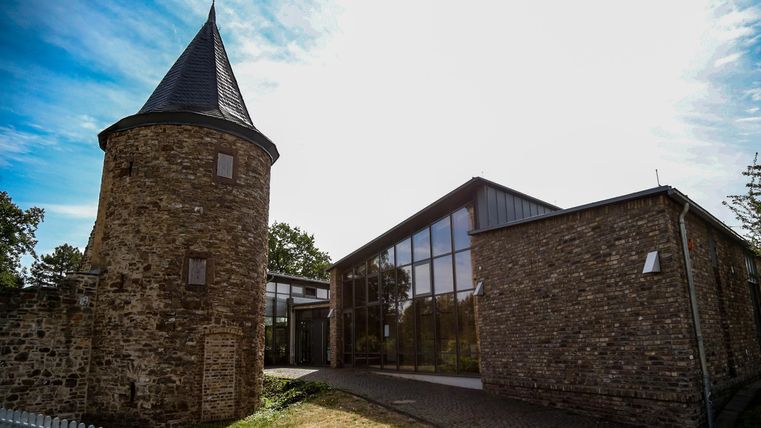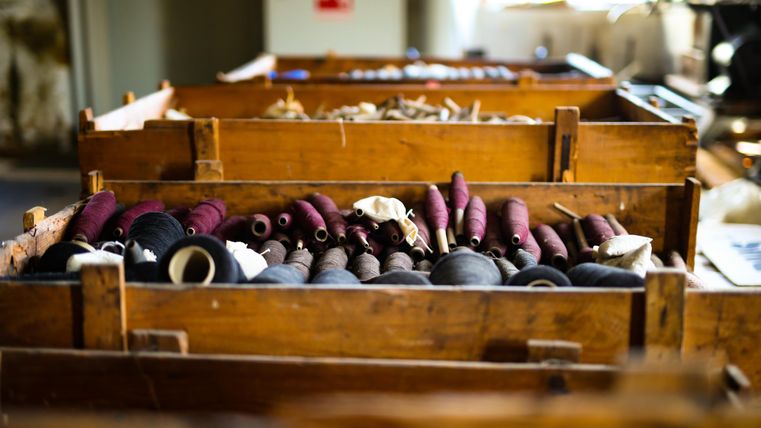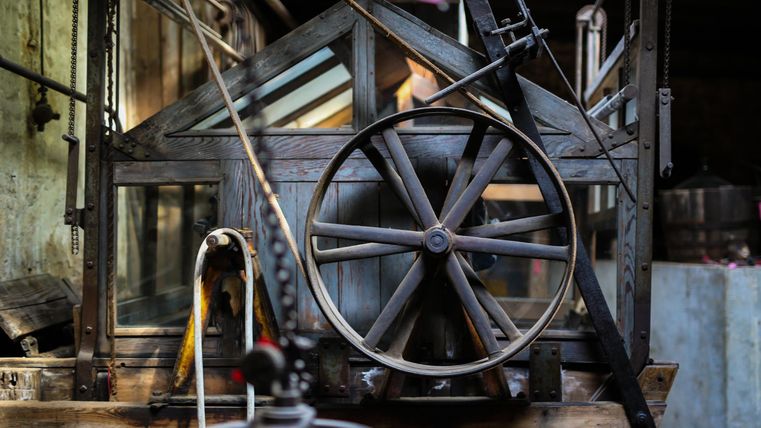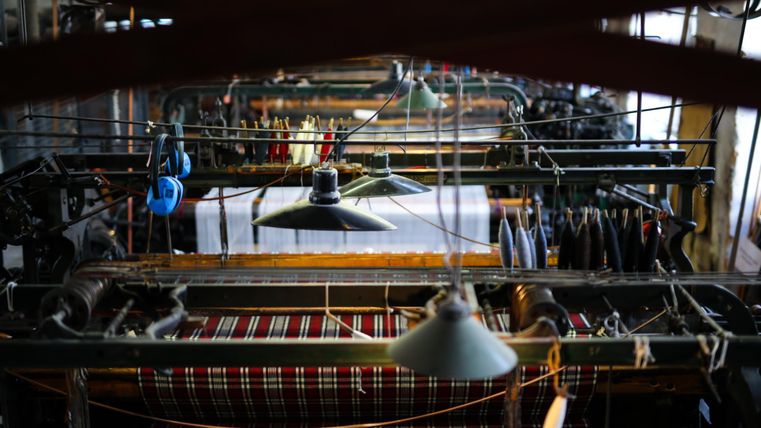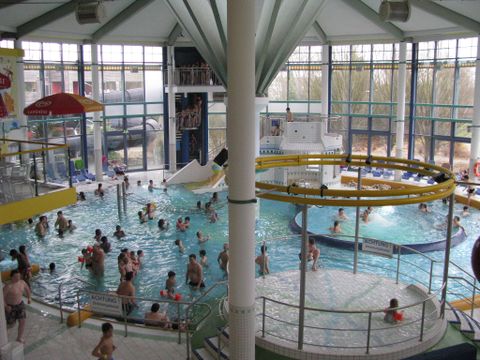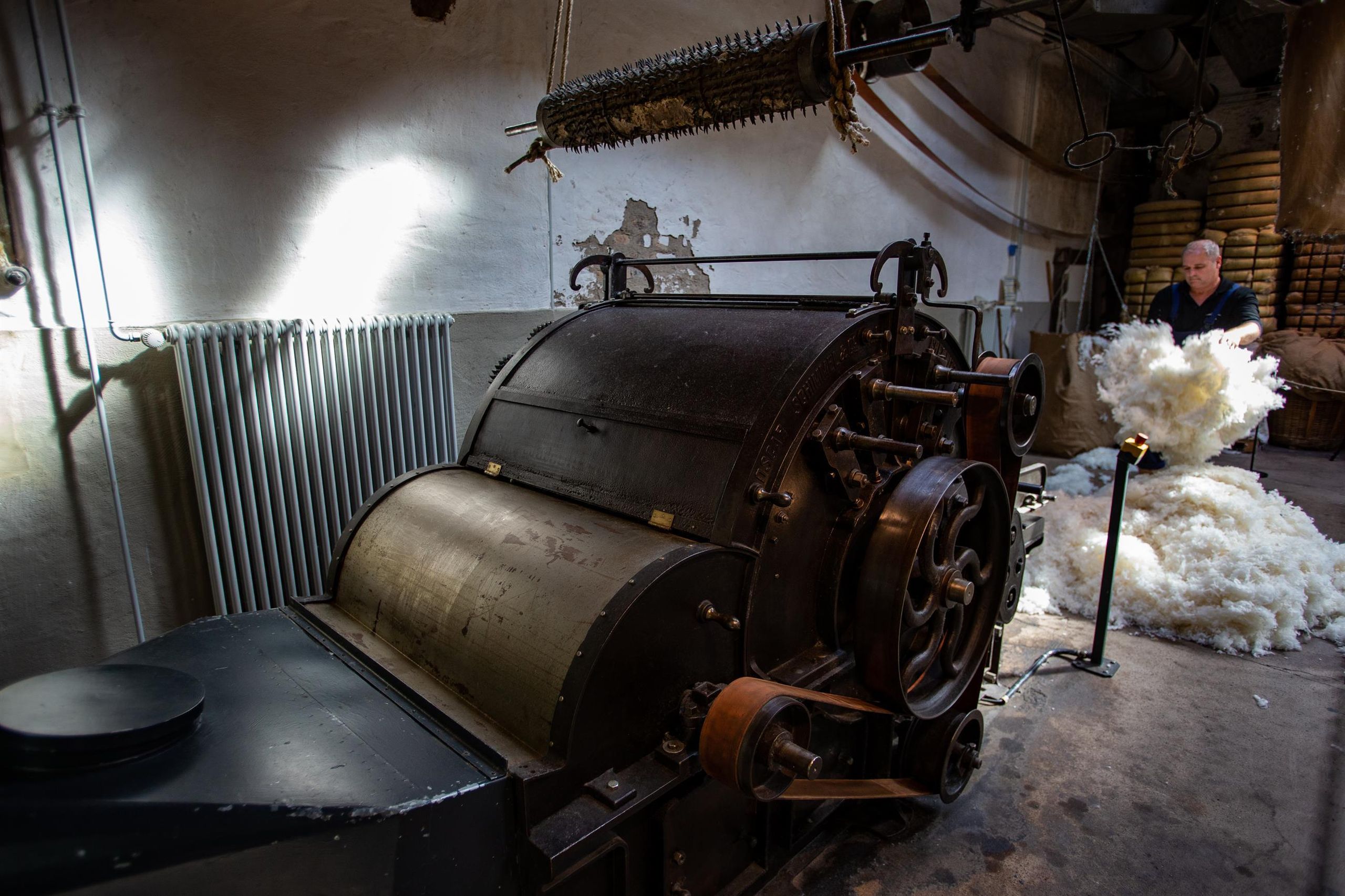
LVR-Industriemuseum / Tuchfabrik Müller
Euskirchen
A recipe for a dyeing solution is written in chalk on a door, an old coffee pot is standing around waiting for its owner, heaps of handwritten notes lie colourfully jumbled on a table - you think that in the Müller cloth factory the workers have only disappeared for a short while and will come right back through the door to continue spinning threads and weaving fabrics. In fact, the Müller cloth factory closed its doors in 1961 and the factory fell into a Sleeping Beauty slumber. Factory owner Kurt Müller hoped to restart his cloth-making machines, but this hope was not fulfilled - for visitors to the LVR Industrial Museum today, this is a stroke of luck, as they are given an unusual insight into cloth production.
The LVR Industrial Museum / Tuchfabrik Müller can only be visited on regular guided tours. It is a small journey into the recent past, when cloth production was a major industry in Euskirchen. The machines and tools are still there where they were once installed and laid down. The guides tell about the technology of the machines, about dyeing and spinning yarn. And then the looms start working. The shuttles whiz back and forth and fine cloth is made from loose wool.
Films, small installations and models illustrate the fascinating world of the factory, they tell of the work, heat and steam in the dye works. The Müller cloth factory is an example of the heyday and decline of the Rhenish woollen cloth industry. At the end of the 1950s, the cloth factory - like many other small woollen cloth manufacturers - came under competitive pressure. Italian manufacturers supplied cheaper goods made of shredded wool, and the factory was forced to close in 1961.
There are changing exhibitions in the entrance area, hands-on activities for children and regular "Steam Sundays" when the steam engine from 1903 is put into operation.
Further information
Note: The historic cloth factory is only accessible with a guided tour, the tour fee is included in the admission price.
Guided Tours of the Cloth Factory
The guided tours (without prior reservation) of the historic cloth factory take place at the following times:
Tuesday – Saturday 11 AM, 1 PM & 3 PM
Sunday and holidays 11 AM, 12 PM, 1 PM, 2 PM, 3 PM & 4 PM
Please arrive at the museum approximately 15 minutes before the start of the tours.
Sunday Café
Every Sunday, the museum café offers freshly baked waffles, cakes, light snacks, and coffee specialties from 11 AM to 6 PM.
| Tuesday | 10:00 - 17:00 |
|---|---|
| Wednesday | 10:00 - 17:00 |
| Thursday | 10:00 - 17:00 |
| Friday | 10:00 - 17:00 |
| Saturday | 11:00 - 18:00 |
| Sunday | 11:00 - 18:00 |
Impressions
Travel-for-all information
Some information on accessibility are listed below. For detailed information please see the evaluation report.
- The name or logo of the museum is clearly recognizable from the outside.
- The cash register is directly visible from the entrance.
- The exhibits are presented visibly.
- A flyer in easy language is available.
- There are no guided tours available for people with cognitive impairments. Tour guides are trained so that people with cognitive impairments can participate in any tour and their concerns are addressed.
Some information on accessibility are listed below. For detailed information please see the evaluation report.
- In the event of an acoustic alarm (e.g. fire alarm), there is no clearly visible flashing light or flashing signal. Since the cloth factory can only be visited within a guided tour, the staff will guide visitors in case of an alarm.
- In the elevator, the outgoing emergency call is confirmed acoustically.
- There is no audio induction loop.
- Some written information about the exhibits is provided.
- There are no guided tours offered for people with hearing disabilities and deaf people.
- In the café there are tables with bright and glare-free lighting, on which there are no lamps standing or hanging that restrict the field of vision.
Some information on accessibility are listed below. For detailed information please see the evaluation report.
- Assistance dogs are allowed.
- Outdoor paths usually have a visually contrasting or tactile perceptible pavement boundary.
- Inside the buildings there are no visually contrasting or tactile detectable ground indicators.
- Rooms, corridors, stairs and the elevator are brightly and glare-free illuminated.
- On the paths and in the rooms of the factory are partly old machines that protrude into the path.
- Except for the main entrance (alternative: side entrance) there are no revolving or rotating doors.
- Glass doors are provided with safety markings.
- Stairs do not have visually contrasting edges.
- In the elevator, the operating elements are designed to be visually contrasting and tactile. An outgoing emergency call is confirmed acoustically.
- The exhibits contrast visually with their surroundings and are well illuminated.
- There is no information in Braille or prismatic writing.
- There are no guided tours offered for visually impaired and blind people.
All areas relevant for testing meet the quality criteria of the label "Accessibility certified - accessible for people with walking disabilities and partially accessible for wheelchair users".
Some information on accessibility are listed below. For detailed information please see the evaluation report.
- There is a marked parking space for people with disabilities (parking space size: 350 cm x 500 cm).
- The path from the car park to the entrance of the main building is 20 m long. It is easy to walk on and drive on.
- The entrance to the main building is stepless. The main entrance door is a rotation door; next to it there is a swing door, which is opened by the staff.
- The special exhibition, the lecture room as well as the café and the toilet for people with disabilities are accessible without steps or thresholds.
- On the outdoor area there is the cloth factory and the outbuilding, which can be reached via a short cobbled path that is usually easy to walk and drive on.
- Access to the cloth factory is infinitely variable via an elevator (measures 108 cm x 146 cm).
- All evaluated passageways/doors available to the guests are at least 90 cm wide.
- The counter of the cash desk is 95 cm high.
- Mobile seating is available.
- The exhibits are predominately visible while sitting.
- There are no wheelchair accessible tables in the café (maximum height 80 cm, wheelchair accessible at a height of 67 cm and a depth of 30 cm).
- Aids offered: wheelchair, museum stool
- There are no guided tours offered for people with walking impairments and wheelchair users.
Public toilet for people with disabilities (main building)
- The maneuvering spaces are:
in front of/behind the door, in front of the toilet and the washbasin at least 140 cm x 145 cm;
left of the toilet 100 cm x 70 cm and right of the toilet 53 cm x 70 cm. - There are handles which can be folded up on the right and left of the toilet.
- The washbasin is wheelchair accessible.
- The mirror can be seen while standing or sitting.
- An alarm trigger is present.
- Certified in the period: July 1, 2025 to June 30, 2028
- Accessibility checked
Contact
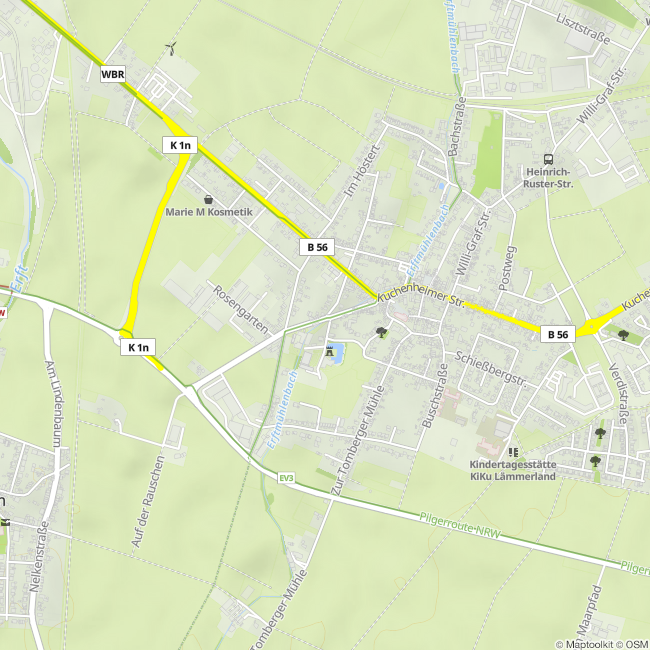
LVR-Industriemuseum Tuchfabrik Müller
Carl-Koenen-Str. 25b
53881 Euskirchen-Kuchenheim
